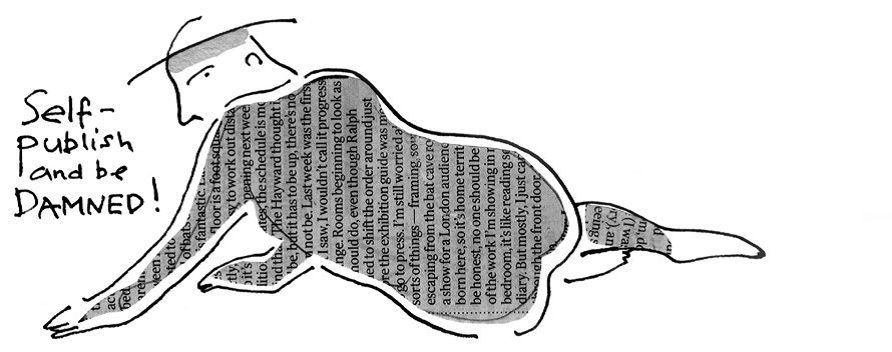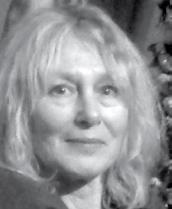Chris Alton considers the value of events for less well-known authors – and how to make smaller events bigger.
The average number of people at author events in libraries and bookshops is apparently only about eight. Of course, some authors attract large audiences to their events on the strength of their name alone but, for the rest of us, this sober fact (you may have some evidence of your own to add to it) is potentially demoralising.
Many authors, nevertheless, feel very positive about holding events, even when those events are small. They feel that talking to an audience about their work is a rewarding process of discovery and insight. They are exhilarated by the risks and opportunities that a live event offers. Jenny Alexander, author of Drift, feels that ‘small events provide a connection to your readers that is not possible with a larger audience’. Events also generate useful local publicity, of course, and enable authors to sell to people who may not otherwise have bought the book. For less experienced authors, small events are also an opportunity to gain confidence in public speaking – which comes in useful if invitations arise for bigger events, such as festivals.
For all that, better-attended events are even more worth doing. So, as you plan posters, postings and press releases, what can you offer that will tempt more people to give up their time and come along?
1) Focus it
‘Authors should identify precisely which group of people should be their target audience to take an interest in and then purchase their book,’ recommends Crispin Drummond at P&G Wells Bookshop in Winchester. He suggests looking for events appropriate to your specific subject, such as country fairs if you are a food or garden writer, or a festival devoted to a relevant theme. ‘In these instances,’ says Crispin, ‘an unknown author with an unknown book can get involved and find a supportive audience.’
An alternative to focusing by genre is to focus on a particular aspect of writing, such as how to devise plots or develop character. The more specific you can be, the better. ‘Plotting the Perfect Crime’, for example, sounds more intriguing than ‘How to Develop a Plot’. ‘Writing Real Young Women’ – which was the title of a Waterstones event – is more inviting than ‘Character Development’. The subtitle of such talks would be along the lines of ‘Author X will illustrate his talk with examples from his book’, thus combining the attractions of something approaching a workshop with promotion of your book.
2) ...and broaden it
Focusing your topic can also mean broadening an event’s appeal. A specific theme could be combined with discussion of books other than your own. You could be the ‘guest author’ with other books chosen by your host and/or by the audience. At the Budleigh Salterton Literary Festival last year, Hilary Mantel discussed ‘My Life in Books’, including works that had influenced her, given her courage or made her laugh.
Another way to broaden your appeal is to connect with authors in your area. Possible group formats could be a ‘Book Bites’ event, a debate, ‘soapbox’ format, or ‘Author Question Time’, and need not be dependent on the content or genre of the books. Examples of some general themes used recently are ‘Other Worlds’ (Ottawa Library) and books with the theme of plots and explosions (Mr B’s Emporium, in Bath).
3) Illustrate it
A visual event need not just mean a talk illustrated with PowerPoint images. A display of mounted images can be the event itself, if space is available. Polly Roberts, author of the travel book Social or Solitary, asked artists to create sculptures, songs and textiles in response to her writing, all of which were exhibited at Norwich Arts Centre (and included in the book). Roberts found that this helped her reach a more diverse audience: ‘I found that for many it is easier to visit an art exhibition than to attend a book reading,’ she says, ‘and by promoting my book alongside an exhibition I made it more accessible. Not all people are “word” people.’

Illustration: Nicola Smee
Visuals are particularly helpful in events for children. Sandra Greaves, author of The Skull in the Wood, brings along her collection of animal and bird skulls. ‘The children are fascinated by them, and I use them to fire their imagination and kick-start ghost stories,’ she says. ‘They spark fantastic writing – often really atmospheric and sometimes downright gruesome.’ A set of intriguing-looking boxes is another type of visual prop that will excite curiosity – or just one large box from which all sorts of interesting objects emerge.
4) Perform it
An event that includes other aspects of entertainment, such as dramatisation, music or dance can work well, particularly for historical books and those with distinctive characters. Writer and musician Ros Brady promoted her book of prose and poetry Next to Me a Robin, written in and around Dartington, in Devon, by performing her songs and exhibiting sketches of the local landscape. Phil Smith, co-author of Walking, Writing and Performance, does all three – and specialises in putting on performances on walking routes and in heritage sites.
If you are not someone who likes performing, it may be possible to link up with a musician or performance artist. This strategy offers mutual moral support and may generate energy, ideas and enthusiasm. Irish writer Erin Hart’s events combine history, memoir and music. She is accompanied at these by her husband, musician Paddy O’Brien, and they also take along the equipment necessary to share images from the stories.
Poetry is often combined with music at events such as ‘Poetry in Concert’ or ‘Jazz Poetry’. Manchester Central Library hosted an ‘Open Mic’ evening for World Book Night this year, with poetry performed by poets from Flapjack Press – and guests invited to book themselves a slot at the mic too. With this kind of event, you may not be promoting just yourself but empowering others too. If you perform music written by someone else, do check the PRS licence situation with the venue, as you may be required to pay a fee.
5) Eat and drink it
Food is not just for cookery books. It may be possible to link different foods with events that inspired the book, your development as a writer or the personalities of your characters. The International Agatha Christie Festival takes full advantage of the period about which Christie wrote and offers events such as a ‘Garden Party Luncheon’ and ‘Tea Dance’. Hillingdon Libraries, in London, offer a ‘Literary Afternoon Tea’ at which authors sit with paying guests at the tables, with a free copy of the book included in the ticket price.
But food can do so much more than this. It can make your audience seem more like your guests. Ffyona Campbell, author of The Hunter-Gatherer Way, gives her audiences cups of a wild berry drink, along with a recipe card. ‘I like to offer a taste of wild food at book events because it transports the audience out of thelibrary and into the wild,’ she says. ‘It also makes me feel more caring towards them – that they are not just another audience, but individuals on a journey.’
6) Place it
Campbell makes the most of links to place and landscape. ‘Sometimes we arrange the chairs around the candles on a tray on the floor as though it is our campfire,’ she says. ‘It feels as though we are no longer constrained by the walls of the room, not shut off from Nature.’
If your novel was inspired by a recognisable locality, as with many crime series, another way to connect with the landscape could be a guided walk around features that inspired elements of your novel. To promote her Tudor historical novels The May Bride and The Lady of Misrule, Suzannah Dunn gave talks at four Tudor National Trust houses. The Agatha Christie Festival has offered a ‘Garden Tour’ featuring poisonous plants that appear in her books.
7) Teach it
Almost any book will lend itself to a writing workshop. There is considerable interest in writing family histories and author Deborah Warne draws on this fascination by presenting successful workshops on the art of written narrative (see www.fromthehearth.org.uk). The difficulties and delights of research is another possible topic, especially if related to family or local history. If you are approaching a writing group about a workshop, your journey to getting published may in itself be of interest, especially if that includes the ins and outs of self-publishing or using social media.
Choose what is right for you. Don’t go along with anyone else’s suggestions unless you feel positive about them. And once you have attracted an audience, the essential factor that will engage them is not your book, but you – your enthusiasm, your love of what you do, your love of sharing that, your sense of humour and, above all, your interest in your audience.
 Chris Alton has worked as a teacher and a librarian and has hosted many author events. She now works freelance and has had articles published in various magazines, mainly on historical subjects.
Chris Alton has worked as a teacher and a librarian and has hosted many author events. She now works freelance and has had articles published in various magazines, mainly on historical subjects.